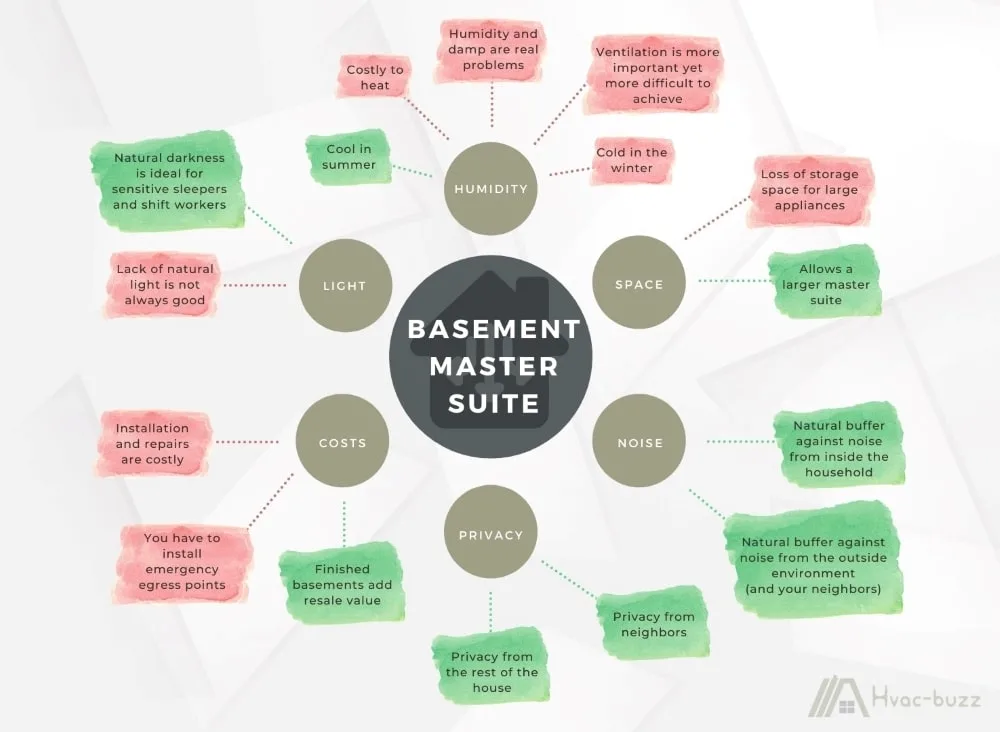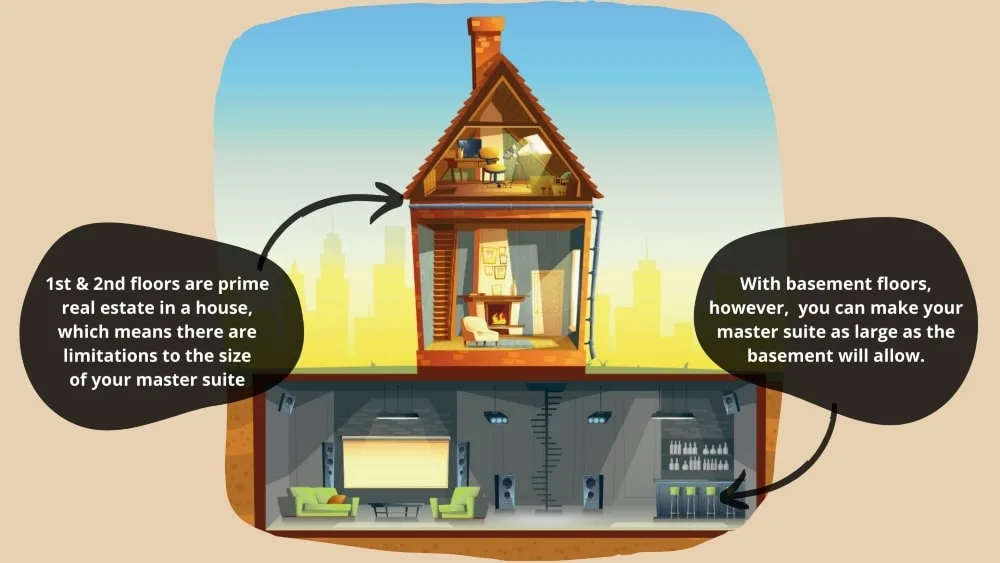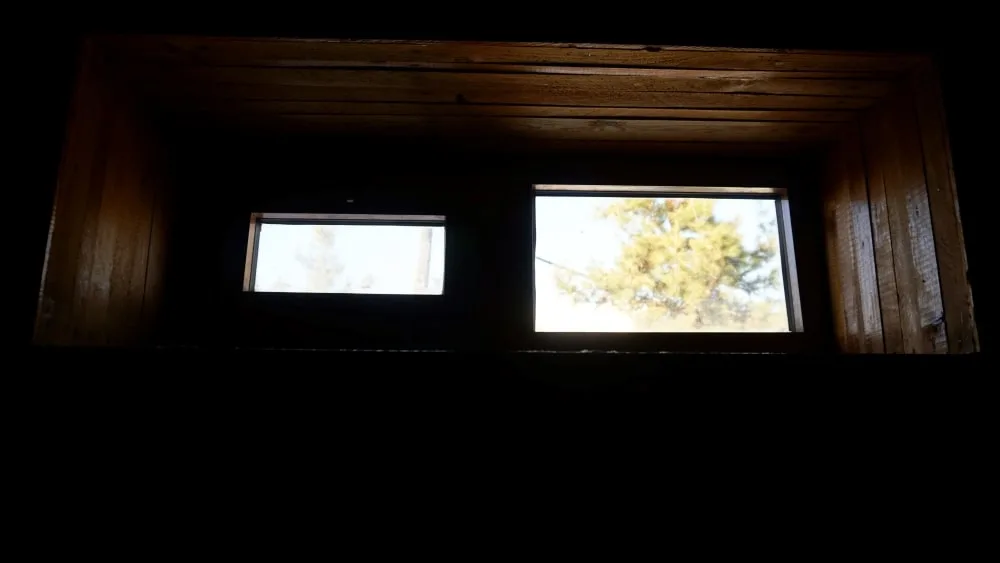| Pros of a basement master suite | Cons of a basement master suite |
| More privacy from neighbors | Cold in the winter |
| More privacy from the rest of the house | Costly to heat |
| Cool in summer | Humidity and damp are real problems |
| Allows a larger master suite | Ventilation is more important yet more difficult to achieve |
| Natural darkness is ideal for sensitive sleepers and shift workers | Lack of natural light is not always good |
| Finished basements add resale value | Loss of storage space for large appliances |
| Installation and repairs are costly | |
| You have to install emergency egress points |

Basement master suites provide more privacy. They are cool in summer, but cold and costly to heat in winter. You can have a large suite and resale values are enhanced but installing and maintaining the basement master suite can be expensive. There is little natural light. You lose storage space.

Pros of a Basement Master Suite
More Privacy From Neighbors
Let’s face it, as much as we all hope there are no prying eyes, windows seem to be a big “look at me” sign.
Sometimes our windows are a little too close to the windows next door. In general, the close living found within a neighborhood means that you are probably going to have to take some steps to ensure your privacy.
A master suite in the basement is a good way to ensure that your bedroom and bathroom are private spaces.
Maybe this is slightly less so with a walk-out basement, but the vantage point of a basement means it’s harder to have accidental peeping-Tom incidents. Also, in the basement you are likely to have the space to make a walk-in closet, which you can ensure is a private space for changing and getting ready to go out.
Can Feel More Private From Rest of House
While we like to think that guests don’t wander around upstairs, there is a bigger chance of people going upstairs (to use the bathroom, visit your kids, etc.) People are far less likely to go down to the basement where there is only the master suite.
In addition, the feeling of privacy is furthered by the noise-dampening effect of being underground. It gives a sense of sanctuary by being able to get away from the noise of the neighborhood and traffic.
Cooler in Summer
Basements are naturally cool rooms. Being underground means that any heat in the room will quickly disperse into the surrounding ground. Not only that, but as the lowest point of the house, it is a magnet for the sinking cold air.
It is not going to take much effort to keep your bedroom cool and you can even employ methods to share the cool air with the rest of the house. You can discover how to do this in my article on How To Move Cold Basement Air Upstairs.
Usually Means a Larger Room
The first and second floors are prime real estate in a house, which means there are often limitations to the size of your master suite.
The basement is a more under-utilized area, and with fewer demands on the space, you can make your master suite as large as the basement will allow.
You might even have space to install that walk-in closet you wanted or a private sitting area.
The space you have to work with as well as the process of finishing the basement would allow you to personalize the master suite more. You can really make the space special and custom-fit.

Naturally Dark Room
If you enjoy having a dark room for sleeping, then the lack of natural light in basements will be an advantage for you.
Night-shift workers may also appreciate the darkness of a bedroom in the basement to help with good sleep.
Finished Basements Add to Resale Value
Your master suite in the basement is unlikely to come cheap, however, you are going to see that compensation if or when you decide to sell your house.
A finished basement looks nicer and generally means less cost on the buyer’s side to fix up.
However, your biggest selling point is going to be the bathroom. A bathroom is a commodity and is always desirable to buyers, especially if that bathroom is well-finished.
If you have a walk-out basement that can have full windows and potentially even doors installed, then you are looking at a large increase in your resale value.
Related article: Can I Use a Basement Floor Drain for a Shower?
Cons of a Basement Master Suite
Cold in Winter
A basement is below ground, and while good for minimizing noise it is not so good for heating.
So, if you live in an area with hot summers you are going to have a great night’s sleep. However, this is a different story in winter when you want any extra heat you can get.
It will take no small amount of effort and planning to make sure that your basement doesn’t turn into an icebox.
Unfortunately, the lack of sun infiltration into the basement also means that there is no source of natural heating for the room. If you want to get heat in the basement, you are going to need to use appliances and ventilation systems.
Increased Cost for Heating
With the heat loss in your basement, you are going to have to spend extra to install the appliances in your basement and house to help keep the room warm.
You may need to install vents, fans, heaters, and you are likely going to require a professional to manage the pressure systems within your house ventilation system.
A good investment will be underfloor heating. Basement floors are cold and it makes a world of differences if you have underfloor heating for your bedroom and bathroom area. This is an extra cost to your renovations though.
Related article: Is Bathroom Underfloor Heating Worth it?
Humidity/Damp Issues
Basements at large are renowned for dealing with a lot of moisture.
The humidity and dampness that come with the territory are going to cause similar problems as they do in bathrooms: mold, mildew, structural and fixture damage, and it will leave your basement with a musty smell.
This means that you are going to have to invest in good ventilation for your master suite and you might need to consider certain fixtures and finishes within the space to make it more resilient.
Ventilating Bathrooms is More Difficult and Important
A well-ventilated bathroom is important as it promotes good airflow, helps with odor control, and prevents damage in the room due to the humidity that comes with showering and bathing.
Your walls, paint, fixtures, cabinets, and ceiling could sustain water damage if your bathroom is not ventilated properly. You are also going to encounter some unwanted guests in the form of mold and mildew.
Now, add the normal ventilation issues with bathrooms on to the fact that basements themselves have humidity and damp issues. Bathrooms can even cause humidity difficulties in adjoining rooms, so ventilation is a step you do not want to skip.
Ventilating a bathroom from a basement is difficult as it must vent outside, however, the ceiling of this floor is the first floor. It is possible to ventilate the below-ground bathroom (which is not allowed to vent into the attic), but it will likely cost more, and you will probably need professional help.
Little to No Natural Light
Some basements do have windows, and you might be able to install them if yours doesn’t. However, it is a fact that sunlight infiltration into a basement will be minimal due to all the obstructions on ground level: fences, plants, etc.
This also means that without sufficient artificial lighting, the space will be very dark. This may not be every person’s cup of tea.

Lost Space for Large Appliances
Basements are a popular place to install some of your larger appliances such as water heaters, washers, dryers, and furnaces.
If you choose to renovate your basement as your master suite, then you are going to lose that space for appliances. If your house has some of these appliances in the basement already, you will have to move whatever you aren’t prepared to have in your bedroom or bathroom.
You are going to be losing a lot of storage space in general, so you need to be prepared to make an alternative place in other areas of the house or leave a portion of the basement for general storage.
Cost of Repairs and Replacements
With a finished basement, you are likely going to have to call in a professional any time you need something fixed or replaced. You are also likely going to have to deal with the need to cut into walls, floors, and finishes in order to expose pipes and wiring systems.
This means that your repair and replacement costs are going to be higher, and you are going to have to spend extra to make the space look good again.
Cost of Installing Emergency Egress Points
Egress windows (or alternative approved egress points) are required if you use the basement as a bedroom.
The risk of a basement comes if you have a single internal entrance. You need to have an alternative exit to outside (yard or street) the house for emergencies.
For installing an egress window, you are looking at a range of pricing depending on multiple factors including what state you live in. A rough estimate is:
- $2,000-$5,000 for professional installation.
- $500-$1,000 for installing it yourself if you have the necessary knowledge.
Is Adding a Bathroom Worth it?

Although it may be an expensive and time-consuming process, adding a basement bathroom is worthwhile and comes with many benefits. Not only are basement bathrooms convenient, but they also add value to your home. The money you invest in a basement bathroom will recoup its value when you sell the house.
How Will The Remodel Cost Be Recouped
Adding a bathroom to your finished basement can typically run anywhere from $5,000-$25,000.
The bulk of this cost comes from running a water line and plumbing down to the basement and back out since it will require the assistance of a licensed professional who will jackhammer through the concrete floors in your basement.
You have some options available to simplify the process and avoid breaking your foundation. You could use either an up-flush toilet or a composting toilet.
The up-flush toilet will increase the running costs of the finished bathroom since it needs a pump that will need to be serviced and replaced. They are also known to clog more easily compared to conventional toilets.

The good news is, a basement bathroom with a shower, sink, and toilet typically adds about $15,000 to the value of your home.
This assumes that the install is done correctly and high-quality materials are used. You will need to be careful to stick to a budget if you are concerned about recouping your money when you sell the home.
Using the absolute highest quality materials may not give you a dollar-for-dollar return. At the same time, using cheap, out-of-style materials is also not appealing to potential home buyers.
Keeping your design on-trend without breaking the bank will help you get the most bang for your buck.
What Do Buyers Want To See
Whether they intend to use your basement as a game room, man-cave, or a guest living area, buyers will be overjoyed to see a full bathroom.
Full Bathroom
Having the extra space and privacy is a major draw and one they will likely pay extra for. A basement bathroom does not have to be a focal point of the house, and it is okay to keep the design somewhat simple.
Still, buyers would like to see a walk-in tiled shower and some modern finishes.
On the other hand, many homeowners want to make their basement bathroom bolder than other areas in the house. You could add a bright wallpapered accent wall or a unique light fixture to add character to the bathroom.
Related article: Can I Use a Basement Floor Drain for a Shower?
Underfloor Heating
When building a bathroom in the basement underfloor heating is definitely something that should be considered. It’s a worthwhile investment that won’t cost much yet will increase the comfort level drastically.
Here are 12 reasons why bathroom underfloor heating is worth investing in.
Basement floors tend to be very cold and uncomfortable.
Especially if you decide to tile the floors, it will be unbearable to walk there barefoot. This is where underfloor heating shines, it will make the floor warm and toasty without breaking the bank.

Electric underfloor heating mat (amazon link) is relatively cheap to install if you do it during construction.
Basically, the only additional costs will be the heating mat and 1-hour extra labor for laying it. There won’t be any additional running costs if the bathroom is being heated anyway.
Here is an helpful calculator that helps you figure out how much electricity it will use and how much it will cost.
Themed Bathroom
Buyers may also like a themed bathroom that fits in with the use of the basement, like including sports paraphernalia in the bathroom if the basement is used as a game room.

If the basement is more of a “man cave,” you could continue the masculine design into the bathroom. However you decide to design it, just remember that your bathroom could be the deciding factor over another home that does not have a basement bathroom.
What Will Get The Best ROI
Not all remodels are the same. If you want to maximize your return, you should consider the following variables:
- Where You Live – Some real estate markets favor basement bathrooms more than others. A finished basement with a bathroom is a common part of a house and will be expected in some larger cities. In one of these areas, your bathroom will be expected to be more than just functional; buyers will expect higher-end finishes.
- Your Materials Selection – Adding a bathroom will increase value to a certain point. If you are using extremely expensive materials, just know you will not get a dollar-for-dollar return. You don’t want to go cheap either. Use average materials which are on-trend and look appealing to save money on the install and increase your ROI.
Should You Consider DIY

Building a basement bathroom is no easy task, and you will be faced with some unique challenges. While some parts of the process can be done yourself, it would be wise to hire a contractor for most of the work.
A large part of the expense of a basement bathroom install comes from paying the contractor, but incorrectly installing these items yourself will cost you more money. It’s not worth it.
Some of the work you should hire a contractor for are:
- Toilet – This can be tricky, especially if you don’t already have a drain for sewage. Your contractor will have to create a drain in your basement floor and connect it to the main waste pipe. Probably not something you’d like to attempt to do yourself.
- Exhaust fan – Ventilation is necessary to remove moisture. The contractor will likely tie into an upstairs vent which can get messy. They will have to repair drywall and possibly roofing to do this, which takes a lot of time and hard work. (If the bathroom is adjacent to an exterior wall, you could vent the exhaust fan through the wall instead. This involves no ductwork and potentially leaky roof vents)
- Plumbing – Your new bathroom will need plumbing to be installed, which could first require them to run a plumbing vent to the roof. Once that is complete, they would have to install water supply pipes from existing pipes to the new shower, sink, and toilet. If this sounds confusing and difficult, you should hire a contractor to do it.
- Lighting – Basement bathrooms don’t usually have natural lighting, so installing the proper lighting is very important, but wiring below ground level is complicated. Doing this wrong could cause injury or even fires.
Here are some unconventional ways to vent a basement
There are easier cosmetic projects that you could do yourself during the remodel. Installing a tile floor or the tile in the shower could be done yourself since they are fairly straightforward processes that do not contain a lot of risks.
This could save you some money off the project’s total cost if the budget is something that is worrying you. Overall, a licensed contractor should do most of the project since it will save you time and reduce the risk of something catastrophic happening.
Is It Worth The Time And Expense
After hearing how much work and money will go into the project, you may be asking yourself if it is even worth it.
I spoke to a Realtor who has experience in selling homes with and without basement bathrooms.
Their answer? It’s always worth adding a bathroom in a finished basement. In fact, they’ve never heard of a buyer thinking a basement bathroom was a negative attribute to a home.
Before you begin your project, you could get in touch with a local real estate agent who could give you an idea of how much value your basement bathroom will add to your home.
They could look at recent market trends and even show you photos of homes with and without basement bathrooms so you can compare your project to theirs.
Overall, finishing a basement and adding a bathroom is absolutely worth the time and expense.
Just make sure it is done properly to avoid any potentially dangerous situations. You will not regret it.
Sources
https://www.natalebuilders.com/blog/is-a-finished-basement-right-for-you
https://www.apartmenttherapy.com/the-pros-and-cons-of-a-basement-apartment-245177
https://www.theplancollection.com/house-plan-related-articles/pros-and-cons-of-basement-foundations
